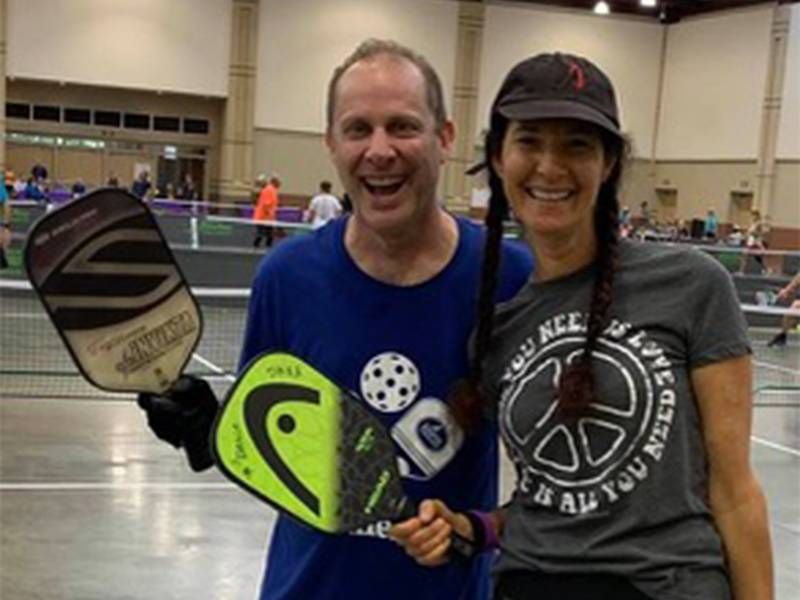Take A Leap, Change Your Life
Find the power in taking a big risk in your personal or professional life
Editor’s note: In honor of Leap Day, Feb. 29, 2024, we're republishing this story which originally ran on Next Avenue in 2021.
I'm at the Signal Mountain, Tenn. recreation center gym watching six pickleball teams battle it out. There's no air conditioning, and the air is thick with the sounds of the constant whop! whop! of paddles smacking balls, the screech of sneakers flying across the floor and the periodic outbursts of shouting and laughter when one team wins or loses a point. To say I'm in my happy place is to grossly understate the way I feel about being here; it's also the most shocking development in my life of late.

Pickleball and I are an unlikely pair, especially when you consider my past relationship to sports: In elementary school, I was the chubby girl who hated recess. In high school, I dropped phys. ed. the minute it was allowed. My forays onto the tennis courts of my adolescence were all about calorie-burning, a mostly unenjoyable and unfulfilling way to spend an afternoon.
But when I met pickleball in May of 2020, I was immediately smitten. Rather quickly, I was playing three days a week (outside, spaced apart, where we all felt safe from COVID-19). Then the indoor gyms opened back up and I found places to play six days a week.
Will I be emboldened to try other unlikely things? I don't know! And that's the whole point.
And then, about two months ago, the unthinkable happened. A fellow player, a man I knew only by last name (Fritz) and the color of his paddle (lime green, like mine) asked if I wanted to play with him in the Senior Olympics.
No, I said, I did not. I love playing for fun, but competition — the kind where something is at stake — makes me deeply uncomfortable. I've avoided it my entire life. It just isn't who I am.
The next day, I walked into the gym and told Fritz I would do it.
Why? Because competition makes me deeply uncomfortable. Because I've avoided it all my life. Because it's not who I am.
Playing in a tournament — much less the Senior Olympics — is a giant leap outside my comfort zone. It's one of the most unlikely things I could ever imagine myself doing. I'm curious about what effect the experience will have on me. Will I see myself in a different light afterward? Will I be emboldened to try other unlikely things?
I don't know! And that's the whole point.
The Size of the Leap Boils Down to Impact
Most of us, at some point in our lives, have taken leaps of faith. We've done things outside our realm of comfort in an effort to get somewhere else, or grow in some way.
Maybe we took a promotion we weren't sure we were ready for. Maybe we left a relationship that wasn't working, even though it was scary and a new one wasn't promised. Maybe we didn't even know it was a leap at the time — we just knew we needed to shake things up.
There's no formula for determining whether a leap is a little one or a big one. What is a small step for one person might be another person's big leap and vice versa. The size of the leap seems to boil down to impact: whether it changed us in big or small ways.

When I quit my 17-year smoking habit at age 32, I expected to feel better and save money. Which I did — but that turned out to be the least of it. Because quitting had been extremely difficult, involving an investment in costly nicotine patches, a lot of tears, nightly cold baths and intensive self-talk, it showed me the kind of resolve I was capable of.
Soon afterward, I completely changed careers, emerged from a decades-long depression and began to see myself as someone in charge of her life, not someone at the mercy of it. What I thought was a small step (quitting smoking) turned out to be a giant leap.
In "The Big Leap: Conquer Your Hidden Fear and Take Life to the Next Level," psychologist Gay Hendricks addresses the fact that we often hold ourselves back from reaching our full potential in relationships, work and wealth.
The problem, he says, is that almost all of us believe, consciously or unconsciously, that there is an upper limit to the level of success we are capable of attaining. (He calls this the "upper limit problem.")
Perhaps we think we can't be successful in love because our parents only modeled poor communication. Or we don't believe we can get a promotion at work because we've never risen any higher than where we are right now. Or maybe, deep down inside, we feel we don't deserve some level of wished-for success.
Whatever the reason for the story we are telling ourselves, one thing is always certain, says Hendricks: "If I cling to the notion that something's not possible, I'm arguing in favor of limitation. And if I argue for my limitations, I get to keep them."
Embracing What's Possible
Hendricks understands the pull to stay where we are. "It's where your own addiction to comfort wants you to stay," he says. "It's also where your family, friends and organization want you to stay. You're reliable there, and you provide a steady supply of all the things that family, friends and organizations thrive on."
The problem, he says, is that if you stay there, "…a deep, sacred part of you will wither and die…" Taking the big leap to realize our untapped potential is what nourishes us.
First, challenge the notion that you can only do so well, rise only so high or be only so happy.
So how do we begin?
First, challenge the notion that you can only do so well, rise only so high or be only so happy.
"We humans have a long and wonderful history of transcending our beliefs about what's possible," says Hendricks. That transcendence begins with allowing ourselves to savor the good that happens to us.
"By extending your ability to feel positive feelings, you expand your tolerance for things going well in your life," Hendricks says. And as you grow your tolerance for good feelings, you expand your belief about what's possible.
As Michelle Davies, life coach and co-founder/editor-in-chief of "The Best Ever Guide to Life" says, "Making a big decision is scary, but the road to progress is paved with big, life-altering choices. Taking a big leap will teach you the value of getting out of your comfort zone and overcoming your fears, help you develop an attitude of courage and improve your mental fortitude for things that are yet to come."
She acknowledges that society places a great deal of emphasis on the importance of logical reasoning when making decisions. But, Davies says, "Often life's most fulfilling gifts come from following your heart. When you refuse to take a chance, you miss out on the opportunity to get to know what limits you can actually exceed."
Preparing for a Big Leap
How do we decide whether to take a big leap or hunker down where we are and wait for a better (or never) time?
One suggestion comes from Jungian therapist James Hollis, who says the question we should NOT ask is whether this leap will make us happy. Research shows that we humans are terrible at predicting what will make us happy, he says (we too often mistake what will make us feel safe and in control for what will make us happy).
A better question to ask, says Hollis, is "Will this choice enlarge me or diminish me?"
We can't know for certain, of course, what the consequences of our decision to leap will be, but we generally know whether it has true growth potential. Because big leaps grow us emotionally, they benefit us at any age. And, of course, we can have as many big leaps as we have ideas, energy and space for.
Lachlan Brown, founder and editor of Hack Spirit, a website dedicated to relationship and life advice, says, "Taking a big leap is one of the most important things you can do in life." But he suggests that it's important to prepare.
"If you're moving to a new place, research costs, lifestyle, language and more before you get on that plane. If you're starting a new business, do in-depth market research before you take out the lease, buy the equipment or start the marketing campaign," Brown advises.
No matter what your leap entails, it can be helpful to lay a little groundwork before you make it.
And, says Brown, even if your leap "fails" by conventional standards, you've still opened the door for enormous personal growth — and just knowing that can be expansive.
Wherever you are in your life, don't assume you can't reach new heights. The world is filled with people who took big leaps at all ages and were changed, not because they succeeded or failed, but simply because they leapt.
Which is exactly what I am telling myself in the run-up to the Senior Olympics in August. I'm not "in it to win it," although I have been practicing like crazy to give myself a fighting chance to play well. I'm in it to expand myself, to see what's possible. Because it's a brand new experience for me at age 59 and because I want to know what will happen if I do this deeply uncomfortable thing (competition) that I've avoided all my life.
It just might be who I am now.

Read More

